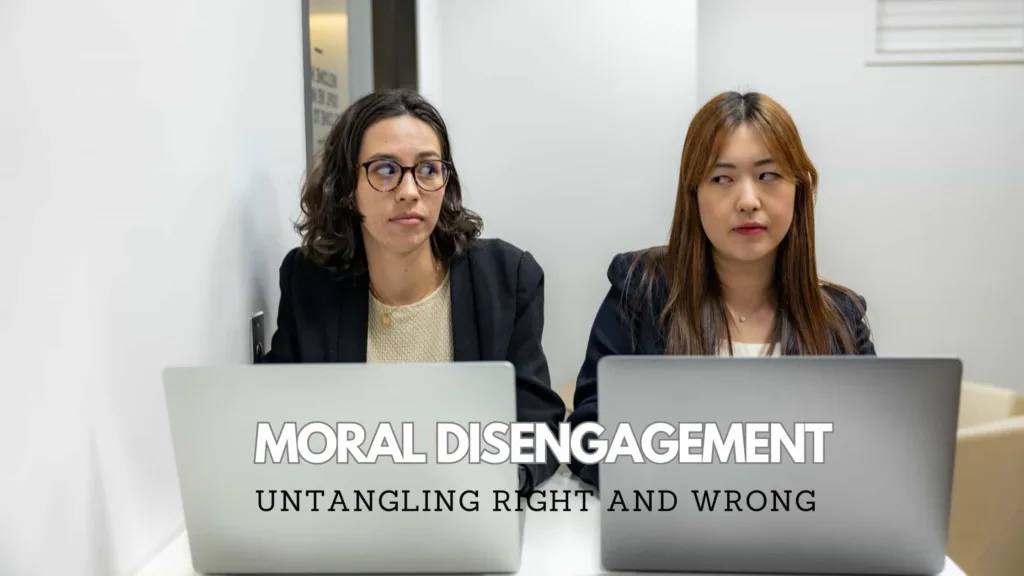Moral Disengagement is like a way our minds trick us into thinking it’s okay to do something that might not be right. A smart psychologist named Albert Bandura came up with this idea. It helps us figure out how our brains work when we try to ignore the moral problems of our actions. This article will talk about what moral disengagement is, how it works, what happens when we do it, and why it’s important for everyone in society to understand.
Mechanisms of Moral Disengagement
Let’s break down each mechanism of moral disengagement with examples:
- Moral Justification: This is when people convince themselves that what they’re doing, which might be considered not so good, is actually okay because it serves a bigger purpose or a good cause.
Imagine someone stealing medicine from a pharmacy, telling themselves it’s for a sick friend who can’t afford it. They believe it’s justified because they’re helping someone in need.
- Euphemistic Labeling: This happens when people use nicer words to make their actions sound better than they really are, downplaying how bad it might be.
Instead of saying they lied, someone might use a softer term like “creative storytelling” to make it sound less harmful.
- Displacement of Responsibility: This is when people blame others or outside forces for their actions, saying it’s not really their fault.
A student might blame a noisy neighbor for failing a test, saying they couldn’t concentrate because of the noise, instead of admitting they didn’t study enough.
- Diffusion of Responsibility: This is like spreading the blame around in a group, so no one person feels fully responsible.
In a group project, if it goes wrong, each member might say, “Well, I thought someone else was handling that part,” so no one takes full responsibility for the failure.
- Dehumanization: This happens when people treat others as if they’re not really human, making it easier to do harmful things to them.
Related Info: Dichotomy: Having two opposite things or ideas
During a conflict, if someone sees the other side as “The Enemy” rather than as people with families and feelings, it becomes easier to justify hurting them.

Consequences of Moral Disengagement
- Doing the Wrong Thing Without Feeling Bad: When people use moral disengagement, they might end up doing things that are not right, and it doesn’t bother them because they convince themselves it’s okay.
- Imagine someone copying homework and thinking it’s fine because everyone does it. They may keep doing it without feeling guilty.
- Feeling Unhappy Inside Using moral disengagement can make people feel sad or uncomfortable inside, even if they don’t show it outside.
- Think of someone spreading mean rumors about a friend and saying they deserve it. Deep down, they might still feel bad about it.
- Harming Friendships: Justifying actions can damage friendships because others may stop trusting them.
- If someone lies and says it’s to protect someone, their friends might find it hard to believe them in the future.
- Forgetting Right from Wrong:
- Simple Explanation: Using moral disengagement too much can make it easier for people to forget what’s really right or wrong.
- Example: Someone who often justifies breaking promises might stop seeing the importance of keeping their word.
- Making Not-So-Good Choices: People who use moral disengagement a lot might end up making choices that aren’t good for them or others.
- If someone thinks stealing from a big store is okay, they might keep making choices without thinking about the consequences
Related Article: Intrapersonal Conflict: Wars Inside Your Mind
Implications for Society
let’s explore the implications of moral disengagement in society in simpler terms:
- Not Following the Rules: When people use moral disengagement, they might not follow the rules because they convince themselves it’s okay to break them. If someone justifies cheating in a game, they may keep doing it without thinking about fairness.
- Trust Issues: Using moral disengagement can make it hard for people to trust each other, as others may doubt the honesty of those who justify their actions. If someone lies and thinks it’s okay because they have a reason, their friends might find it tough to trust them.
- Creating Problems in Groups: Moral disengagement can cause issues in teams or groups because people might not take responsibility for their actions. In a school project, if someone blames others for not working hard, it can create problems and make the project suffer.
- Making Society Less Fair: If many people use moral disengagement, it can make society less fair because everyone might start thinking it’s okay to do whatever they want. If people start justifying not paying for things they take from a store, it can make it harder for businesses to stay open.
- Forgetting to Help Others: Moral disengagement can make people less likely to help others in need because they might convince themselves it’s not their responsibility. If someone sees a person struggling but thinks, “It’s not my problem,” they might not offer help.
Conclusion:
Moral disengagement is a tricky thing that needs a good look. If we understand how it works and what happens because of it, we can try to make it less of a problem. We can do this by teaching people, making them aware, and encouraging everyone to be kind and understanding. That way, we can all make the world a better and friendlier place.

Pingback: Discrepant Events: In the Shadows of Anomalies